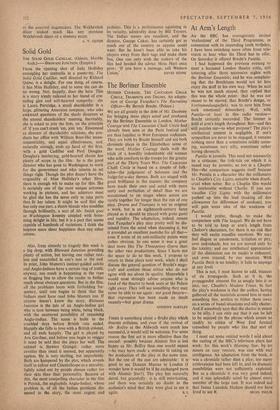At Arm's Length
As the BBC has courageously invited 'evaluations' of the Third Programme, in connection with its impending tenth birthday, I have been switching more often from tele- vision to hear what the Third has to offer. On Saturday it offered Brecht's Puntila.
I had happened the previous evening to meet a harassed London theatre critic, still tottering after three successive nights with the Berliner Ensemble; and he was complain- ing that the Brechtians would not let him enjoy the stuff in his own way. When he said he was not much moyed, they replied that this was the whole point: that he was not meant to be moved; that Brecht's design, or Verfremmdungseffekt, was to, save him from such emotional debauchery. Well, with Puntila—at least in this radio version— Brecht certainly succeeded. The listener is held at arm's length throughout. But—and this still puzzles me—to what purpose? The play's intellectual content is negligible. If one's sympathies are never to be engaged, it remains nothing more than a sometimes mildly amus- ing, sometimes very silly, sometimes rather boring chronicle.
Parana is juvenile. This need not necessarily be a criticism; the folk-talc on which it is based may be juvenile; so too is a Chaplin film—the comparison suggests itself because Mr. Puntila is a character like the millionaire in Chaplin's City Lights, amiable when drunk, cruel when sober. But a Chaplin film would be intolerable without Charlie. If you can visualise City Lights with the millionaire pushed up into the lead (making all due allowances for differences of medium), you will gain some idea of the weakness of Puntila.
I would prefer, though, to make the comparison with The Seagull. We do not have to be told to keep at arm's length from Chekov's characters, for there is no risk that they will excite maudlin emotions. We may feel disgust or amusement, irritation or pity, over individuals; but we are moved only by the totality; and our intellectual appreciation (if the distinction can be made) is enhanced, and even created, by our emotion. With Puntila there is no totality; it fails to impinge at any level.
This is not, I must hasten to add, because of its propaganda. Such as it is, the propagandist element fits as snugly into it as into, say, Chaplin's Modern Times. In fact the play's weakness is that the author, having gathered all the materials around him to make something tine, prefers to fritter them away on a series of banal situations and silly chatter. And if somebody says that the chatter is meant to be silly, I can only say that it can be left to be enjoyed (in the phrase which comes so readily to critics of West End farcical comedies) by people who like that sort of thing.
I must eat some unkind words I said about the casting of the BBC's television plays last
week; for this week's Morning Star, by no
means an easy venture, was cast with real intelligence. An adaptation from the book, it was a chronicle rather than a play; too many irrelevancies had been left in, and its dramatib possibilities were not sufficiently exploited. But as a chronicle it was very good indeed, and it was splendidly acted by almost every member of the large cast. It was indeed sad that James Lansdale Hodson should not have


































 Previous page
Previous page